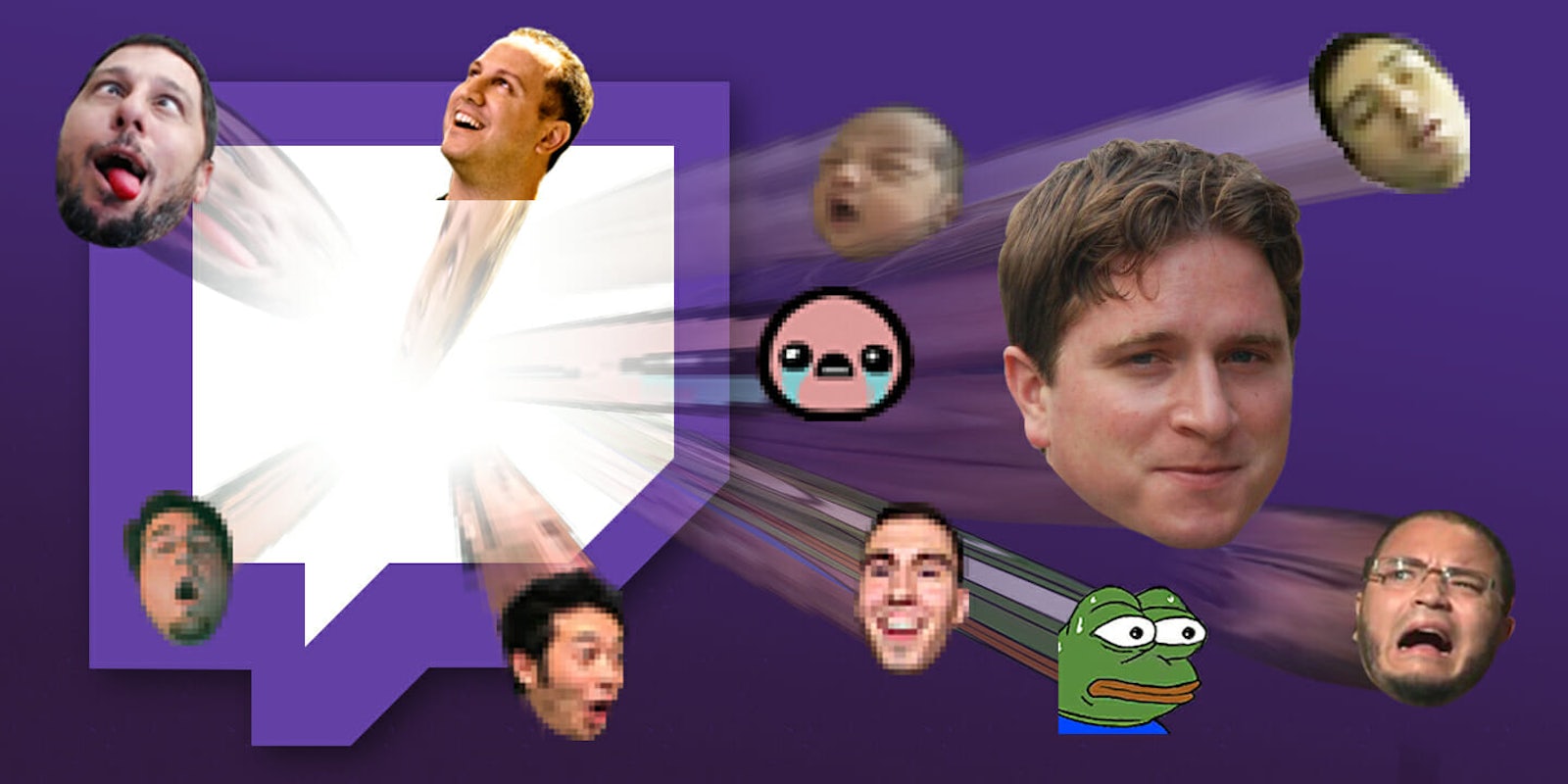Once upon a time, people thought they’d be piloting flying cars by the year 2021. Sorry, Mom and Dad, that didn’t precisely work out. At least we have emoji, though, I guess? Over the past few years, those silly little pictographic symbols have become the international language of posting fire memes and keeping it 100. They can be used sincerely or ironically, an eggplant can be a penis, and you only need one character to spell out “ayy, lmao bruh!”
But just when you thought you’d learned emoji, now you’ve got a whole new symbolic meme language to master. On Twitch.tv, the internet’s primary hub for video game streaming and esports videos, there’s a parallel set of icons and a very specific vocabulary that goes with them. If you’re new to Twitch, you probably have no idea what a “PogChamp” or a “Kappa” are, or whose faces represent them, but they’re such an ingrained part of the culture. that popular broadcasters often say them out loud while live-streaming. And even though Twitter doesn’t support Twitch emotes, people steeped in the culture will spell them out in tweets, too.
Emotes have only been around since 2015 (Twitch started in 2011), but in just a couple of years, they’ve become an indelible part of gamer slang. The most popular ones are used millions of times per day on the platform, according to stats from twitchemotes.com and kappa.ws, and they’re referenced more than you might’ve realized on other social media and in real life. You might hear the names of the emotes dropped in casual conversation, and you might even see players imitating emote faces in photos:
Back from Bahamas and will try to get some points for Spring Playoffs from ladder. https://t.co/RdimJVgaoY pic.twitter.com/EPGMLLskcJ
— Eugene Shumilin (@Neirea_) March 29, 2017
You can never really master all the emotes on Twitch because streamers create new ones for their channels all the time, but you can learn the handful that is near-universal on the site. Without further ado, here’s a (very) basic guide to Twitch emote vocab.
Twitch emotes
4head

The smiling face of League of Legends streamer Cadburry signifies laughter. People tend to spam it in chat whenever someone is cracking up on a stream, but it can also be used sarcastically to indicate that the streamer made a joke that fell flat.
Jerax is just so DAMN good !
But Ana got jebaited by the courier though … 4Head#kievmajor— Zein Skeif (@Zein_44) April 24, 2017
BabyRage

BabyRage is, not surprisingly, the face of an angry baby. It’s used to throw a tantrum or indicate displeasure with something, whether it’s how a game is going or how a streamer is acting on camera. You can also post it to call someone out for whining.
Twitchemotes.com attributes this one to Dota 2 pro player Arteezy, who’s apparently notorious for getting emotional over bad games. If you spend way too much time on Twitch, you might mutter it out loud when things don’t go your way in real-life situations. Nerd.
BibleThump

BibleThump is another crying child emote, this one the face of Isaac from the indie video game The Binding of Isaac. It’s a more general weeping emoji than BabyRage. It can refer to anything sad or disappointing, and it doesn’t carry the same connotations of immaturity and juvenile whining. It’s presumably called “BibleThump” because The Binding of Isaac was partially inspired by the biblical tale of Isaac.
That was such a sweet, genuine moment. Twitch chat went nuts with BibleThump.
— nocendi (@n0cendi) April 24, 2017
BrokeBack
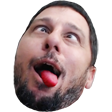
The face of Alan from the SeriousGaming Twitch channel, shown with eyes crossed and tongue lolling out, is used to indicate that someone has done something eye-rollingly stupid. Sometimes it’ll refer to a player who’s using a deck or character that’s considered trivially easy to play (there was a Hearthstone deck jokingly called “brokeback druid, for example), but it can also come out when someone says something idiotic on-stream. The equivalent slang term on the non-Twitch internet is probably “derp.”
DansGame

The visage of Dan from Dansgaming recoiling in horror and disgust can be used to refer to any upsetting situation, whether it’s disgustingly bad gameplay or a streamer telling a gross story. His expression pretty much speaks for itself.
You can’t cook?! DansGame
— Tigerhood1014 (@JaxGlov) April 24, 2017
Jebaited
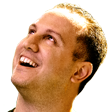
Jebaited is the face of well-known fighting game tournament organizer Alex Jebailey, who’s infamous for his enormous ego. According to a comment on Reddit’s OutOfTheLoop, “His ego is so big that he was actually made into a character in the game Divekick, and his head grows in size every time he wins a round.” “Jebaited” is just a funnier way of saying “baited,” as in being tricked into falling for a trap or ruse. Players and viewers can both be “jebaited” in various ways.
This emote is so famous that it’s even used on non-fighting-game channels. It’s actually picked up its own copypasta, a piece of text that gets repeatedly pasted into chats whenever the situation calls for it:

We’ll get to what “Kappa” and “PogChamp” mean in just a moment.
And you think I’d want to play video games with you? HAH! JEBAITED!
— ThatTokenGuy (@Token_TTG) April 24, 2017
Kappa

Kappa, the most popular (and perhaps most important) emote on Twitch, is a universal indicator for sarcasm or trolling. It’s often pasted at the end of a trolling request for the streamer to make a really bad play or do something dumb on camera, and streamers will sometimes say it out loud when they’re joking. It can also be used as a synonym for a wry “lol,” and this happens fairly often on Twitter.
The smug kappa face belongs to Josh DeSeno, a former employee of Justin.tv, the streaming video site that spawned Twitch. DeSeno told FiveThirtyEight in 2015 that he named his emote after a legendary, turtle-like Japanese monster called the kappa.
Kappa is posted around 400 times each minute on Twitch. It’s such a big deal that people bring giant cutouts of DeSeno’s head to wave in the stands at major esports events, and even at non-gaming events like WWE’s Monday Night Raw:
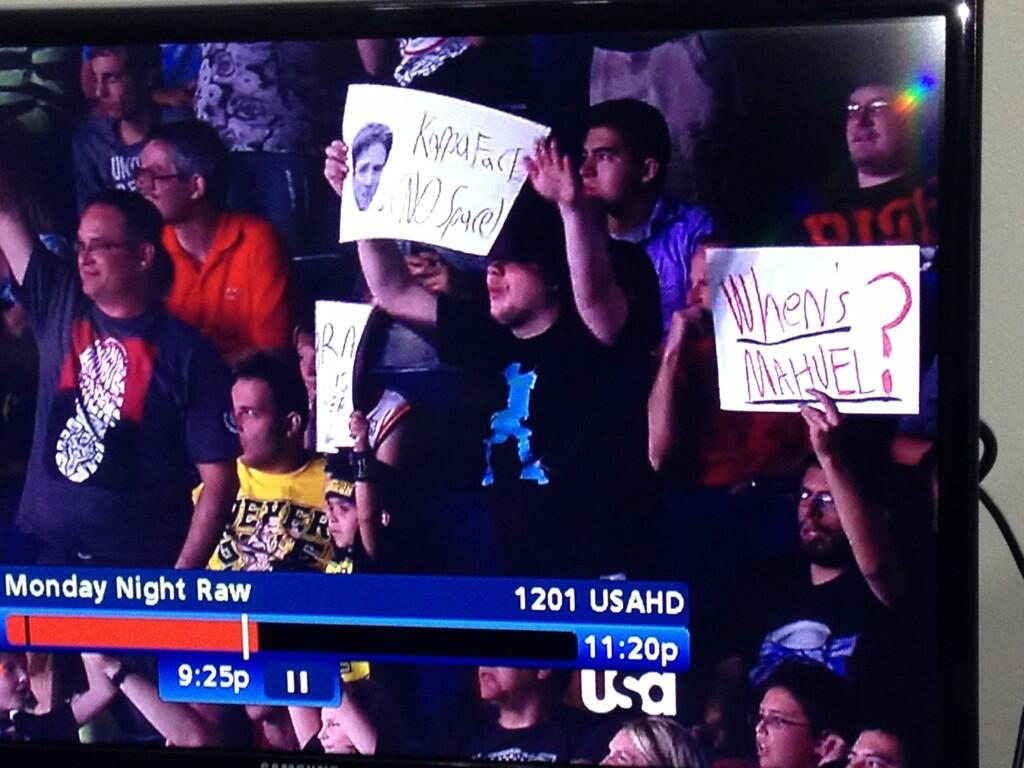
See also: KappaPride, a rainbow version of the face that indicates LGBTQ pride (and is sometimes rudely used to call something “gay”), and Keepo, a cat-eared version of Kappa based on the Dota 2 character Meepo.
There’s even a rare golden Kappa that seems to be randomly bestowed upon a small number of accounts. For those lucky people, the golden version replaces the regular Kappa, but its effects wear off after a day or so.
Not big enough? That’s what she said Kappa
— Groodz (Zgordox) (@MGMasterGroudon) April 24, 2017
Kreygasm

Kreygasm, an icon of the streamer Kreyg with his mouth open—apparently either shouting in excitement or having an orgasm—indicates great excitement. Basically, you can use it anywhere you would use “Whoa!” or “Holy shit!” Kreygasm is so popular that it’s spawned a whole subgenre of emotes, and several popular streamers have created custom icons of their own “gasm” faces.
EAGLES PLAY IN LA ON MY BDAY
Kreygasm
—
GO BIRDS
(@C9Mang0) April 20, 2017
monkaS
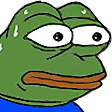
MonkaS, pronounced “monka ess,” is what happens when meme culture and Twitch culture collide. It’s popular 4chan icon Pepe the Frog nervously sweating bullets. It typically indicates that someone is nervous, embarrassed, or facing a high-pressure situation.
Why is Pepe called “monka” on Twitch, though? It seems that Nymn, a popular news broadcaster (and sometimes Hearthstone player) on Twitch, had a subscriber called MonkaSenpai, and monkaS began life as his personal emote (a high honor in any popular Twitch channel). From there, popular Hearthstone streamers added the Pepe to their own channels, and the name “monka” just stuck. It even attached itself to Pepe variations like monkaWut and Megamonka, It’s not that Twitch streamers are unaware of Pepe—it’s just that he’s “monka” there by tradition.
MonkaS isn’t a standard Twitch emote, but it’s available through a popular add-on called BetterTTV, and it’s fairly common to see streamers add it to their channel’s emote list.
Tried to get some practice in whilst on the flight, turns out it’s only good enough to check twitter monkaS
— Hughesy (@HughesyHS) April 24, 2017
PogChamp
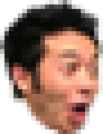
PogChamp, which is used both to indicate surprise and to celebrate victory, has a bit of an elaborate backstory. The face belongs to Ryan “Gootecks” Gutierrez from the fighting game show Cross Counter, and it’s taken from the beginning of this video:
But the name PogChamp comes from a different Cross Counter video, where Gootecks and Mike Ross have a very serious showdown in the obsolete ’90s game pogs. Gootecks ends up winning by dropping a heavy MadCatz arcade fighting stick on the pog stack, hence the moniker “PogChamp.”
In January 2021, the PogChamp emote was banned after Gutierrez encouraged his followers to watch a video of a woman being shot during the Capitol riot on Jan. 6. He had also reportedly spread misinformation in the build-up to the Capitol riot.
Honestly, if I ever see a verified badge in my chat (if I ever stream again LUL) I’ll fucking PogChamp and possibly shout them out TBH
— Joe (@JoeRonimO19) April 24, 2017
On Jan. 8, the PogChamp emote returned but without the original likeness.
ResidentSleeper

If you’re bored out of your mind by the match you’re watching, the emote you’re looking for is ResidentSleeper, used to communicate that whatever’s on-screen at the moment is putting you to sleep. Alternately, it could mean that you’re just really tired.
ResidentSleeper, although synonymous with boredom, actually has one of the better backstories of any emote. The streamer Oddler attempted to play Resident Evil games on camera for 72 consecutive hours but only made it to 66 before falling asleep with his stream still running. People kept watching as he slept, and his nap ended up getting more viewers than his gameplay.
Dr Doom is so ResidentSleeper
— ApologyMan (@ApologyMan) April 24, 2017
Wutface
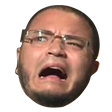
Wutface is the scared, confused face of esports broadcaster and Twitch employee Alex “Goldenboy” Mendez, and it signifies terror or confusion at whatever’s going on in the stream. There’s some overlap with the “wtf” implications of DansGame, but Wutface has a monopoly on the “bewildered” part of the surprise spectrum. You can use it whenever something just doesn’t make sense.
For context, here’s the original “Wutface” photograph:
@GoldenboyFTW pic.twitter.com/uv4VTVJmXE
— Mikey♦️Uncaged (@MikeyDiamond412) April 30, 2015
If the human body is 75% water, how can you be 100% salt? WutFace
— Twitch Chat Bot (@TwitchChatTweet) April 24, 2017
Trihard
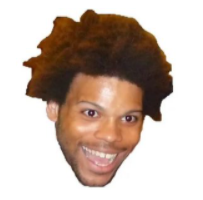
TriHard means you’re trying too hard. You’re over-excited. You should chill. This emote is a 2012 photo from TriHex, a popular Twitch streamer.
HeyGuys

This one’s fairly self-explanatory: You use it to welcome new users when they enter the chat or to say hello yourself upon entry. That face you’re seeing is Twitch’s former recruiting director, Selan Akay, and was added back in the O.G days of 2014.
SMOrc
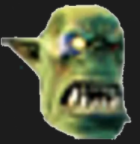
This emote is a fixture during Hearthstone streams and emerged on the scene in 2017. It’s used when someone is being obnoxious or speaking in all-caps. The orc’s likeness comes from the game Space Marines, hence the “S.M.”
KEKW
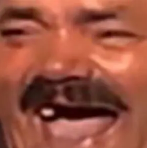
This emote is from a viral 2007 interview with Spanish comedian Juan Joya Borja where the guy basically laughs contagiously. You use the emote likewise to signal laughter on Twitch. As for the name: It’s a World of Warcraft translation thing: Horde players spell out “LOL,” and Alliance players see “KEKE.” Get it?

